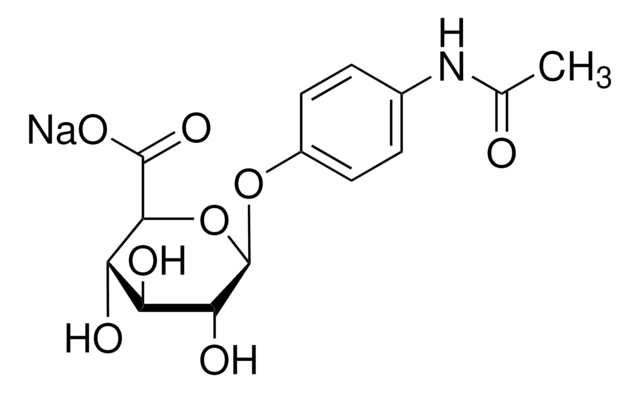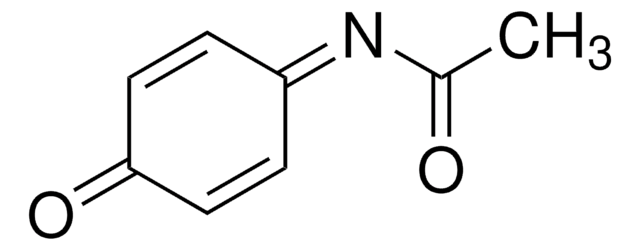UC448
Paracetamol sulfate potassium salt
solid, ≥97% (HPLC)
Synonym(s):
4-Acetamidophenol sulfate ester potassium salt, Acetaminophen sulfate potassium salt, N-(4-Sulfoxyphenyl)acetamide monopotassium salt
About This Item
Recommended Products
Assay
≥97% (HPLC)
form
solid
color
white to off-white
mp
163 °C
solubility
H2O: soluble
storage temp.
2-8°C
SMILES string
[K+].CC(=O)Nc1ccc(OS([O-])(=O)=O)cc1
InChI
1S/C8H9NO5S.K/c1-6(10)9-7-2-4-8(5-3-7)14-15(11,12)13;/h2-5H,1H3,(H,9,10)(H,11,12,13);/q;+1/p-1
InChI key
AJYPYWFCUWHZMZ-UHFFFAOYSA-M
Looking for similar products? Visit Product Comparison Guide
General description
Application
Biochem/physiol Actions
Packaging
Preparation Note
Other Notes
Signal Word
Danger
Hazard Statements
Precautionary Statements
Hazard Classifications
Eye Dam. 1 - Skin Irrit. 2 - Skin Sens. 1 - STOT SE 3
Target Organs
Respiratory system
Storage Class Code
11 - Combustible Solids
WGK
WGK 3
Flash Point(F)
Not applicable
Flash Point(C)
Not applicable
Personal Protective Equipment
Certificates of Analysis (COA)
Search for Certificates of Analysis (COA) by entering the products Lot/Batch Number. Lot and Batch Numbers can be found on a product’s label following the words ‘Lot’ or ‘Batch’.
Already Own This Product?
Find documentation for the products that you have recently purchased in the Document Library.
Customers Also Viewed
Articles
Human epithelial intestinal colonic organoids can be used as an alternative to Caco-2 drug permeability assays for drug screening and compound toxicity testing.
Our team of scientists has experience in all areas of research including Life Science, Material Science, Chemical Synthesis, Chromatography, Analytical and many others.
Contact Technical Service






